Hello,
The volume of my built-in microphone on my ThinkPad T14s (Gen 1, AMD) is really low. I have tried boosting the audio using pulse audio but that did not work. I think it is a driver related issue since it works perfectly fine using Windows 10.
I am using Manjaro 21.1.2 GNOME, with kernel Linux 5.13.13-1-MANJARO.
System:
Kernel: 5.13.13-1-MANJARO x86_64 bits: 64 compiler: gcc v: 11.1.0
parameters: BOOT_IMAGE=/boot/vmlinuz-5.13-x86_64
root=UUID=6e12e4bb-bd01-4f80-9111-0639404f8c65 rw quiet splash apparmor=1
security=apparmor udev.log_priority=3
Desktop: GNOME 40.4 tk: GTK 3.24.30 wm: gnome-shell dm: GDM 40.1
Distro: Manjaro Linux base: Arch Linux
Machine:
Type: Laptop System: LENOVO product: 20UHCTO1WW v: ThinkPad T14s Gen 1
serial: <filter> Chassis: type: 10 serial: <filter>
Mobo: LENOVO model: 20UHCTO1WW v: SDK0R32862 WIN serial: <filter>
UEFI: LENOVO v: R1CET66W(1.35 ) date: 07/30/2021
Battery:
ID-1: BAT0 charge: 51.4 Wh (88.6%) condition: 58.0/57.0 Wh (101.8%)
volts: 12.7 min: 11.5 model: SMP 5B10W139 type: Li-poly serial: <filter>
status: Unknown cycles: 5
Memory:
RAM: total: 30.59 GiB used: 5.95 GiB (19.4%)
RAM Report: permissions: Unable to run dmidecode. Root privileges required.
CPU:
Info: 8-Core model: AMD Ryzen 7 PRO 4750U with Radeon Graphics bits: 64
type: MT MCP arch: Zen 2 family: 17 (23) model-id: 60 (96) stepping: 1
microcode: 8600106 cache: L2: 4 MiB bogomips: 54316
Speed: 3042 MHz min/max: 1400/1700 MHz boost: enabled Core speeds (MHz):
1: 3042 2: 3240 3: 1409 4: 1399 5: 1442 6: 1399 7: 1513 8: 1717 9: 2825
10: 2621 11: 1991 12: 4055 13: 1562 14: 1836 15: 1427 16: 1444
Flags: 3dnowprefetch abm adx aes aperfmperf apic arat avic avx avx2 bmi1
bmi2 bpext cat_l3 cdp_l3 clflush clflushopt clwb clzero cmov cmp_legacy
constant_tsc cpb cpuid cqm cqm_llc cqm_mbm_local cqm_mbm_total cqm_occup_llc
cr8_legacy cx16 cx8 de decodeassists extapic extd_apicid f16c flushbyasid
fma fpu fsgsbase fxsr fxsr_opt ht hw_pstate ibpb ibrs ibs irperf lahf_lm
lbrv lm mba mca mce misalignsse mmx mmxext monitor movbe msr mtrr mwaitx
nonstop_tsc nopl npt nrip_save nx osvw overflow_recov pae pat pausefilter
pclmulqdq pdpe1gb perfctr_core perfctr_llc perfctr_nb pfthreshold pge pni
popcnt pse pse36 rdpid rdpru rdrand rdseed rdt_a rdtscp rep_good sep sha_ni
skinit smap smca smep ssbd sse sse2 sse4_1 sse4_2 sse4a ssse3 stibp succor
svm svm_lock syscall tce topoext tsc tsc_scale umip v_spec_ctrl
v_vmsave_vmload vgif vmcb_clean vme vmmcall wbnoinvd wdt xgetbv1 xsave
xsavec xsaveerptr xsaveopt xsaves
Vulnerabilities: Type: itlb_multihit status: Not affected
Type: l1tf status: Not affected
Type: mds status: Not affected
Type: meltdown status: Not affected
Type: spec_store_bypass
mitigation: Speculative Store Bypass disabled via prctl and seccomp
Type: spectre_v1
mitigation: usercopy/swapgs barriers and __user pointer sanitization
Type: spectre_v2 mitigation: Full AMD retpoline, IBPB: conditional, IBRS_FW,
STIBP: conditional, RSB filling
Type: srbds status: Not affected
Type: tsx_async_abort status: Not affected
Graphics:
Device-1: AMD Renoir vendor: Lenovo driver: amdgpu v: kernel bus-ID: 06:00.0
chip-ID: 1002:1636 class-ID: 0300
Device-2: Chicony Integrated Camera type: USB driver: uvcvideo bus-ID: 2-2:2
chip-ID: 04f2:b6cb class-ID: fe01 serial: <filter>
Device-3: Jieli USB PHY 2.0 type: USB driver: snd-usb-audio,uvcvideo
bus-ID: 6-2.3:8 chip-ID: 1224:2a25 class-ID: 0102
Display: wayland server: X.org 1.20.13 compositor: gnome-shell driver:
loaded: amdgpu note: n/a (using device driver) - try sudo/root display-ID: 0
resolution: <missing: xdpyinfo>
OpenGL: renderer: AMD RENOIR (DRM 3.41.0 5.13.13-1-MANJARO LLVM 12.0.1)
v: 4.6 Mesa 21.2.1 direct render: Yes
Audio:
Device-1: AMD vendor: Lenovo driver: snd_hda_intel v: kernel bus-ID: 06:00.1
chip-ID: 1002:1637 class-ID: 0403
Device-2: AMD Raven/Raven2/FireFlight/Renoir Audio Processor vendor: Lenovo
driver: snd_rn_pci_acp3x v: kernel alternate: snd_pci_acp3x bus-ID: 06:00.5
chip-ID: 1022:15e2 class-ID: 0480
Device-3: AMD Family 17h HD Audio vendor: Lenovo driver: snd_hda_intel
v: kernel bus-ID: 06:00.6 chip-ID: 1022:15e3 class-ID: 0403
Device-4: Jieli USB PHY 2.0 type: USB driver: snd-usb-audio,uvcvideo
bus-ID: 6-2.3:8 chip-ID: 1224:2a25 class-ID: 0102
Sound Server-1: ALSA v: k5.13.13-1-MANJARO running: yes
Sound Server-2: JACK v: 1.9.19 running: no
Sound Server-3: PulseAudio v: 15.0 running: yes
Sound Server-4: PipeWire v: 0.3.34 running: yes
Network:
Device-1: Realtek RTL8111/8168/8411 PCI Express Gigabit Ethernet
vendor: Lenovo driver: r8168 v: 8.049.02-NAPI modules: r8169 port: 3400
bus-ID: 02:00.0 chip-ID: 10ec:8168 class-ID: 0200
IF: enp2s0f0 state: down mac: <filter>
Device-2: Realtek vendor: Lenovo driver: rtw89_pci v: N/A modules: rtw89pci
port: 2000 bus-ID: 03:00.0 chip-ID: 10ec:8852 class-ID: 0280
IF: wlp3s0 state: up mac: <filter>
IP v4: <filter> type: dynamic noprefixroute scope: global
broadcast: <filter>
IP v6: <filter> type: noprefixroute scope: link
WAN IP: <filter>
Bluetooth:
Device-1: Realtek Bluetooth Radio type: USB driver: btusb v: 0.8
bus-ID: 6-4:4 chip-ID: 0bda:4852 class-ID: e001 serial: <filter>
Report: rfkill ID: hci0 rfk-id: 3 state: up address: see --recommends
Logical:
Message: No logical block device data found.
RAID:
Message: No RAID data found.
Drives:
Local Storage: total: 476.94 GiB used: 23.85 GiB (5.0%)
SMART Message: Required tool smartctl not installed. Check --recommends
ID-1: /dev/nvme0n1 maj-min: 259:0 vendor: Lenovo model: UMIS RPIRJ512VME2OWD
size: 476.94 GiB block-size: physical: 512 B logical: 512 B speed: 31.6 Gb/s
lanes: 4 type: SSD serial: <filter> rev: 1.8Q1908 temp: 42.9 C scheme: GPT
Message: No optical or floppy data found.
Partition:
ID-1: / raw-size: 360.44 GiB size: 353.72 GiB (98.13%)
used: 23.82 GiB (6.7%) fs: ext4 dev: /dev/nvme0n1p4 maj-min: 259:4
label: N/A uuid: 6e12e4bb-bd01-4f80-9111-0639404f8c65
ID-2: /boot/efi raw-size: 260 MiB size: 256 MiB (98.46%)
used: 29.3 MiB (11.4%) fs: vfat dev: /dev/nvme0n1p1 maj-min: 259:1
label: SYSTEM uuid: 3AB6-9A89
Swap:
Alert: No swap data was found.
Unmounted:
ID-1: /dev/nvme0n1p2 maj-min: 259:2 size: 16 MiB fs: <superuser required>
label: N/A uuid: N/A
ID-2: /dev/nvme0n1p3 maj-min: 259:3 size: 116.23 GiB fs: ntfs label: Windows
uuid: 009CBC309CBC21D8
USB:
Hub-1: 1-0:1 info: Full speed (or root) Hub ports: 1 rev: 2.0
speed: 480 Mb/s chip-ID: 1d6b:0002 class-ID: 0900
Hub-2: 2-0:1 info: Full speed (or root) Hub ports: 2 rev: 2.0
speed: 480 Mb/s chip-ID: 1d6b:0002 class-ID: 0900
Device-1: 2-2:2 info: Chicony Integrated Camera type: Video driver: uvcvideo
interfaces: 5 rev: 2.0 speed: 480 Mb/s power: 500mA chip-ID: 04f2:b6cb
class-ID: fe01 serial: <filter>
Hub-3: 3-0:1 info: Full speed (or root) Hub ports: 2 rev: 3.0 speed: 5 Gb/s
chip-ID: 1d6b:0003 class-ID: 0900
Hub-4: 4-0:1 info: Full speed (or root) Hub ports: 4 rev: 2.0
speed: 480 Mb/s chip-ID: 1d6b:0002 class-ID: 0900
Hub-5: 5-0:1 info: Full speed (or root) Hub ports: 2 rev: 3.1 speed: 10 Gb/s
chip-ID: 1d6b:0003 class-ID: 0900
Hub-6: 6-0:1 info: Full speed (or root) Hub ports: 4 rev: 2.0
speed: 480 Mb/s chip-ID: 1d6b:0002 class-ID: 0900
Device-1: 6-1:2 info: Realtek BillBoard Device type: Billboard driver: N/A
interfaces: 1 rev: 2.0 speed: 12 Mb/s chip-ID: 0bda:2169 class-ID: 1100
serial: <filter>
Hub-7: 6-2:5 info: Genesys Logic Hub ports: 4 rev: 2.0 speed: 480 Mb/s
power: 100mA chip-ID: 05e3:0608 class-ID: 0900
Device-1: 6-2.1:6 info: Logitech G203 LIGHTSYNC Gaming Mouse type: Mouse,HID
driver: hid-generic,usbhid interfaces: 2 rev: 2.0 speed: 12 Mb/s
power: 300mA chip-ID: 046d:c092 class-ID: 0300 serial: <filter>
Device-2: 6-2.2:7 info: Logitech Keyboard K120 type: Keyboard,HID
driver: hid-generic,usbhid interfaces: 2 rev: 1.1 speed: 1.5 Mb/s
power: 90mA chip-ID: 046d:c31c class-ID: 0300
Device-3: 6-2.3:8 info: Jieli USB PHY 2.0 type: Video,Audio
driver: snd-usb-audio,uvcvideo interfaces: 4 rev: 2.0 speed: 480 Mb/s
power: 500mA chip-ID: 1224:2a25 class-ID: 0102
Device-4: 6-3:3 info: Synaptics Prometheus MIS Touch Fingerprint Reader
type: <vendor specific> driver: N/A interfaces: 1 rev: 2.0 speed: 12 Mb/s
power: 100mA chip-ID: 06cb:00bd class-ID: ff00 serial: <filter>
Device-5: 6-4:4 info: Realtek Bluetooth Radio type: Bluetooth driver: btusb
interfaces: 2 rev: 1.0 speed: 12 Mb/s power: 500mA chip-ID: 0bda:4852
class-ID: e001 serial: <filter>
Hub-8: 7-0:1 info: Full speed (or root) Hub ports: 2 rev: 3.1 speed: 10 Gb/s
chip-ID: 1d6b:0003 class-ID: 0900
Sensors:
System Temperatures: cpu: 59.0 C mobo: N/A gpu: amdgpu temp: 46.0 C
Fan Speeds (RPM): fan-1: 2800
Info:
Processes: 381 Uptime: 1h 15m wakeups: 1 Init: systemd v: 248
tool: systemctl Compilers: gcc: 11.1.0 Packages: 1245 pacman: 1236 lib: 334
flatpak: 0 snap: 9 Shell: Zsh v: 5.8 running-in: gnome-terminal inxi: 3.3.06
What should I do to make this better?
Thank you in advance!
 Welcome to Manjaro!
Welcome to Manjaro!  to give us more information so we can see what’s really going on.
to give us more information so we can see what’s really going on.
 this message and I’ll come back and have another look.
this message and I’ll come back and have another look.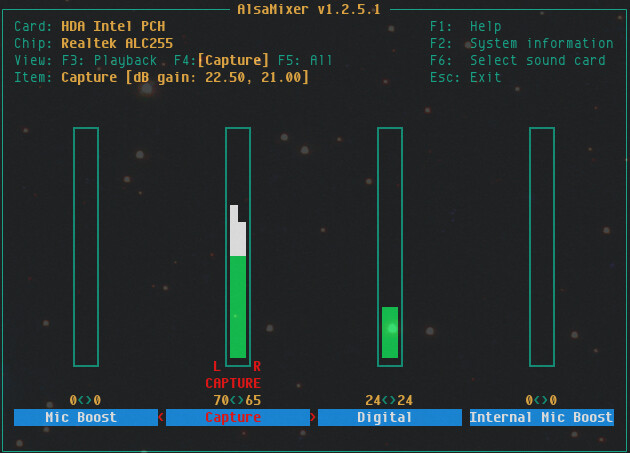
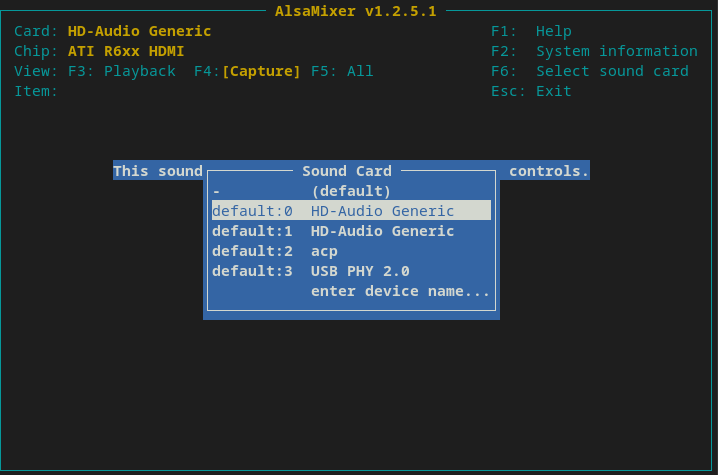
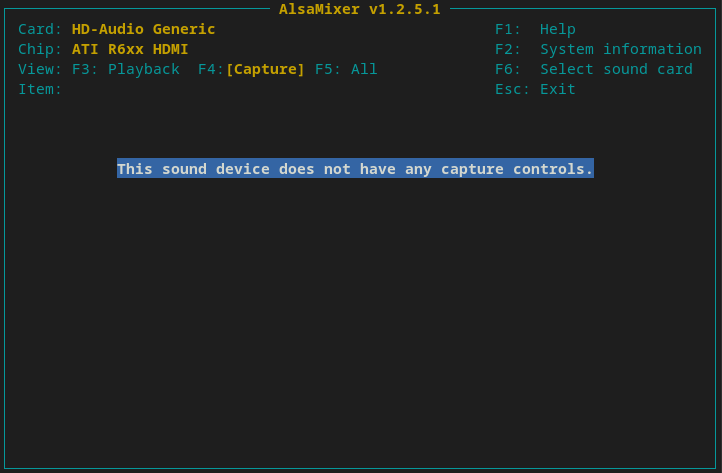
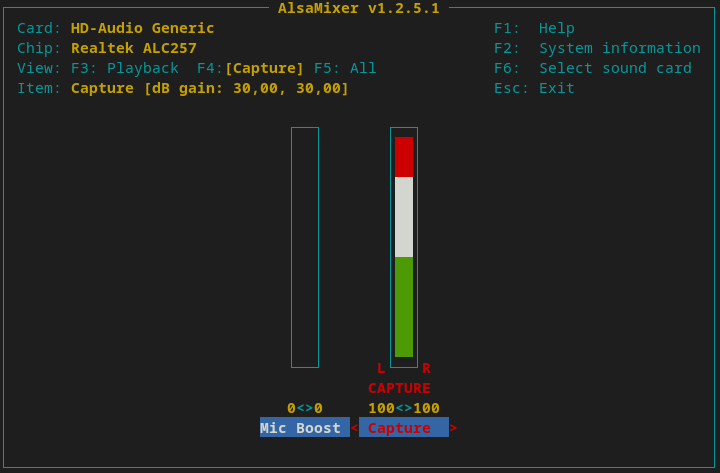
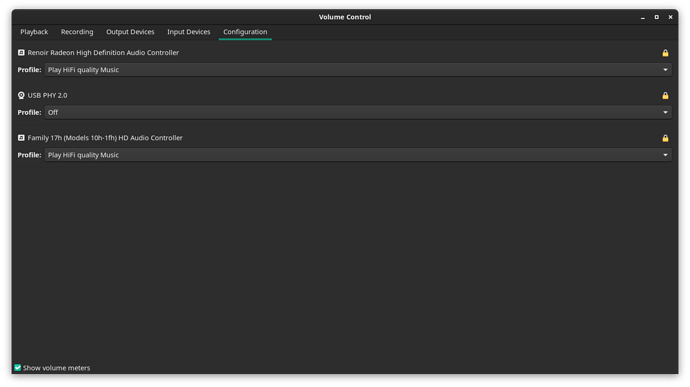
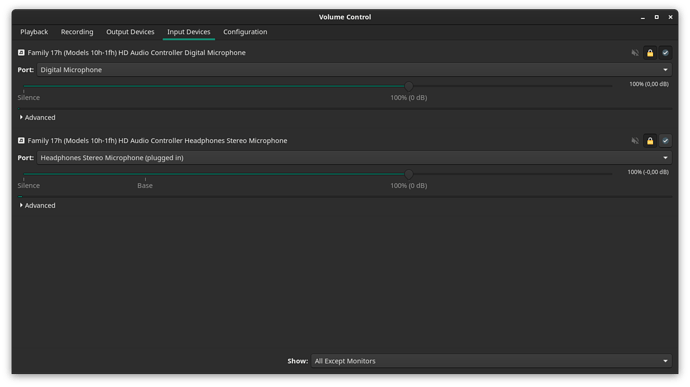


 (I have a similar laptop; never tried the internal mic though)
(I have a similar laptop; never tried the internal mic though)